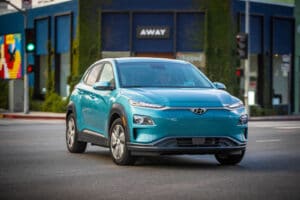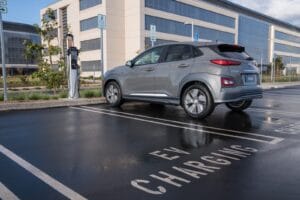
(This story has been updated with new information.)
Just days after it showed the world its all-electric Ioniq brand, Hyundai announced it’s recalling 82,000 electric vehicles around the world with batteries that have caught on fire.
The South Korean automaker says about 76,000 of those vehicles are battery-electric Kona EVs built between 2018 and 2020. The rest are a mix of Ioniq models and city buses.
Hyundai officials told TheDetroitBureau that 26,700 of the vehicles are in South Korea with 55,000 in other regions around the world. The number of those in the U.S. and Canada is not currently available.
At the moment, the recall is focused on South Korea, but officials told tech website The Verge that it will “be taking a similar action in the U.S. and Canada.”
“We are working closely with NHTSA and Transport Canada on the recall and will communicate the details to affected customers shortly,” a Hyundai spokesperson told TheDetroitBureau.
Determining the cause
Although the move is pretty simple — recalled the affected vehicles — determining the reason for the problem is much more difficult, according to officials with Hyundai and LG Energy Solutions, which produces the cells.

For now, each side is pointing the finger at the other.
LG Energy claims the automaker incorrectly applied recommendations about fast battery charging management. Conversely, the government’s transport ministry claims to have discovered defects in some of the battery cells.
It should be noted that General Motors recalled about 68,000 Chevrolet Bolts last November due to potential fire issues. The company developed a temporary software fix for the problem, but also recommended not charging its vehicles past the 90% range in the meantime.
Other manufacturers who have experienced battery fires include Jaguar, Volkswagen, Audi and China’s NIO. BMW, Ford and Hyundai have all experienced recalls related to EV battery fires in recent months.
What’s next?
In the interim, both companies are telling vehicle owners to limit charging to 90% of the battery capacity until the cells can be replaced. Taking care of the issue is expected to cost the automaker about $900 million, which it will split with LG Energy.
The automaker recalled 129,000 vehicles in the U.S. in December to resolve a fire risk with some of its gasoline-powered vehicles. The action covers a variety of 2015-2016 Veloster, 2012 Santa Fe, 2011-2013 Sonata Hybrid, and 2016 Sonata Hybrid vehicles.
The problem centers on connecting rod bearings inside the engine that can wear prematurely. Over time the worn bearings can damage the engine, raising the potential for a fire. The company said dealers will inspect the affected vehicles, at no cost to the owner, and if bearing damage is found, the engine will be replaced, the National Highway Traffic Safety Administration said.








This will be so common a year from now it won’t even make the news. Note to self — ask stock broker to invest in Charging Bunker contractors.
And you thought ‘range anxiety’ was bad.
There is no question battery fire issues NEED to be addressed. Just curious, though, how much you’ve invested in companies dealing with ICE vehicle fires? There were 189,150 *reported* fires in 2019, up over 4% from the year before. There’ve been massive recalls related to these. Remember the one involving new Ford Escapes? How about the 1 million BMWs recalled for fire risks? I can run down a longer list if you want but it is now well above 10 million since mid-decade. And that’s with a known and well-established technology.
Again, the risk of fire in EVs is real and concerning. But one does need perspective. The risk of fire in ICE vehicles is real and concerning.
Paul E.
I happen to have an EV that I charge it in my garage, but I say a little prayer when I do. What’s the old saying, “There’s no atheist with an EV.”
LOL!